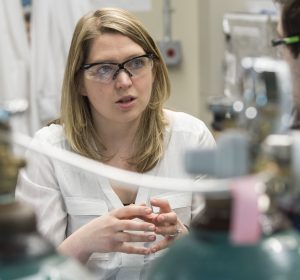Eight UConn scientists and engineers were awarded coveted Faculty Early Career Development Award from the National Science Foundation this year.
The NSF Faculty Early Career Development (CAREER) Program supports early-career faculty who have the potential to serve as academic role models in research and education, and to lead advances in the mission of their department or organization. Activities pursued by early-career faculty build a firm foundation for a lifetime of leadership in integrating education and research.
Recipients this year include:

Julia Valla, assistant professor of chemical and biomolecular engineering, received $500,000 over five years for her project to aid the fuel-processing industry, which faces mandatory government- and industry-issued standards that require the reduction of sulfur in transportation fuels (e.g., gasoline, diesel, and jet fuels) to near-zero levels. Hydrodesulfurization (HDS) is the widely-accepted commercial refinery technology used for the removal of sulfur in fuels. Although HDS is effective, it is also energy intensive, particularly as refineries attempt to meet tighter regulatory standards of sulfur. This project will establish a new technological platform enabling the development of environment-friendly “filters” for the efficient and cost-effective absorptive desulfurization (ADS) of liquid hydrocarbon fuels. Such “filters” will be portable, compact, and regenerable and may eventually be integrated into vehicle engines or gas stations. Successful design of these desulfurization “filters” will transform the fuel processing industry by reducing combustion-based sulfur emissions.

Jessica Rouge, assistant professor of chemistry, the College of Liberal Arts and Sciences, received $632,374 for her work, inspired by the virus life cycle, to develop new chemical strategies to synthesize shells that can encapsulate small molecules and release them in response to specific stimuli. The strategy is important for developing more sensitive biological sensors and more accurate drug delivery systems.
Oleksii Mostovyi, assistant professor of mathematics, the College of Liberal Arts and Sciences, will receive $420,000 for his project providing methods for pricing, hedging, stability and asymptotic analysis in financial markets. The work will further our understanding of incomplete markets, or markets which have a limited capability to offset risks, and the sensitivity of such markets to different types of perturbations and trading restrictions.

Yupeng Chen, associate professor of biomedical engineering, received $480,625 over four years for his project on Osteoarthritis (OA), which affects an estimated 30 million people in the United States, making it one of the leading causes of disability. OA is a degenerative joint disease involving in the degeneration of joint cartilage. This leads to pain, stiffness, movement problems, and activity limitations. Currently, there is no clinically successful therapeutic to against OA. As a Nobel-prize winning discovery, siRNA can effectively and specifically inhibit disease gene expression, which provides a great therapeutic potential to treat OA. However, it is extremely challenging to deliver negatively-charged siRNAs to infiltrate avascular, dense, negatively-charged tissue matrix, such as cartilage. This research will develop a novel delivery vehicle, which can self-assemble with therapeutic siRNAs and deliver them into matrix-rich tissues in an effective and safe manner.

Daniel McCarron, assistant professor of physics, the College of Liberal Arts and Sciences, will receive $645,000 over five years for his work on the development of techniques to trap large groups of molecules and cool them to temperatures near absolute zero. The possible control of molecules at this low temperature provides access to new research applications, such as quantum computers that can leverage the laws of quantum mechanics to outperform classical computers.
 Xiaojing Wang, assistant professor of statistics, the College of Liberal Arts and Sciences was awarded $420,000 for work to advance statistical modeling for personalized education. The research will be integrated within K-12 education through the application of the developed methods to a personalized learning platform in such applications as computerized tests and surveys. This platform is widely used by students from Grade 2 to 12 throughout the United States.
Xiaojing Wang, assistant professor of statistics, the College of Liberal Arts and Sciences was awarded $420,000 for work to advance statistical modeling for personalized education. The research will be integrated within K-12 education through the application of the developed methods to a personalized learning platform in such applications as computerized tests and surveys. This platform is widely used by students from Grade 2 to 12 throughout the United States.

Bin Feng, assistant professor of biomedical engineering, received $549,656 over five years, for his research into chronic pain, its treatment, and curbing the current epidemic of prescription opioid abuse, which costs $500 billion annually in medical, economic, social and criminal ramifications. The most serious side effects of opioids, including physical dependence and addiction, arise from unintended effects on the central nervous system (CNS). Pain is generally evoked from the periphery and thus targeting the peripheral nervous system (PNS) could alleviate pain without unintended CNS effects. However, drug-based treatments to selectively target the PNS remain largely unsuccessful. Peripheral neuromodulation treats chronic pain by focused delivery of physical energy (usually electrical current) to PNS tissues. However, current peripheral neuromodulation methods are unpredictable and only benefit a fraction of chronic pain patients. Feng aims to develop novel experimental and computational tools to advance our mechanistic understanding of peripheral neuromodulation, and provide new experimental and theoretical data to improve neuromodulation for benefiting a broader patient population with chronic pain.

Sabato Santaniello, assistant professor of biomedical engineering, received $500,000 over five years for his research into control methods for neuronal networks under uncertainty. The control of biological neural networks underpins the development of minimally-invasive brain therapies as well as adaptive learning for cyber-physical systems, but it remains challenging because of the irregular dynamics involved. These systems also have sparse and weak connections and a range of dynamics that cannot be fully probed. There is an urgent need to determine the impact of unmodeled dynamics on the controllability of these networks and develop robust controls accordingly, otherwise controllers will remain underperforming, fragile, and hard to calibrate. This is the case for deep brain stimulation, which follows a conservative “one-size-fits-all” paradigm and remains underutilized despite having the potential to treat millions of people worldwide. The objective of this CAREER program is to develop identification methods that estimate the impact of unmodeled dynamics on neuronal circuits and a robust control framework for these circuits.



